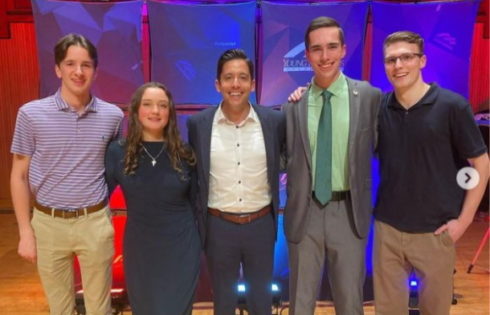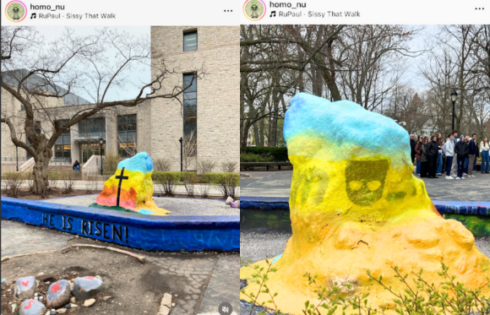
Appeals panel ignores evidence, imposes charge without notice
A student found responsible for sexual assault claims that his accuser tried to commit suicide because he refused to stay with her after their consensual sexual encounter.
The federal due-process lawsuit against the University of Arkansas alleges that it failed to follow its own rules and ran a Title IX investigation designed to “achieve a predetermined false and unsupported result” against the accused student.
“John Doe” didn’t learn until after the investigation that the taxpayer-funded institution was under heavy pressure to show it was tough on sexual assault.
It was under investigation by both the U.S. Department of Education and Arkansas Legislature, and had recently been sued by a female student who claimed it mishandled her Title IX complaint.
Doe suggests that his accuser’s “media blitz” following the “confidential Title IX process” was the reason his initial exoneration was overturned on appeal.
MORE: Columbia gives ‘half-assed’ apology to exonerated student
The appeals panel not only ignored a Title IX coordinator’s finding that “Jane Roe” was not incapacitated during their encounter, but also a female police officer’s report that Roe gave inconsistent and “contrary” accounts between the police and Title IX investigations.
It waited until holding its own hearing to charge Doe with a new violation, sexual assault “by force,” according to Doe’s suit. The panel flipped the burden of proof, finding that Doe couldn’t show “the presence of consent” and using “junk science” to condemn him.
The university’s doubt about Doe’s guilt is reflected in the punishment it issued him “without explanation or rationale,” he says – just 10 hours of community service. Most male students in Doe’s situation at the university were suspended or expelled.
While he graduated with a 3.9 GPA, Doe’s dream of getting into graduate school has been “adversely affected” because he’ll have to disclose the finding against him, as will his professors in any letter of recommendation.
The university declined to comment to The College Fix, saying it does not comment on pending litigation.
‘Choose me over your friends’
Doe and Roe had been friends before an October 2017 incident where the two had their first and last sexual encounter, according to the lawsuit.
They decided to “hang out” after Roe left a Halloween-themed party, sending him several coherent text messages along the way to Doe’s apartment. She confirmed during the investigation she was “not drunk” before arriving and did not drink anything with him.
Roe initiated sex with Doe, and after it was over, they discussed Roe’s previous relationship with an ex-boyfriend. The suit says Roe told Doe that she “had a crush on him since summer 2013.”
When Doe invited Roe to come with him to pick up friends downtown, she allegedly protested having to leave his apartment, telling him that he should “choose me over your friends” and “I need this tonight.”
MORE: Not even Mattress Girl’s sexual assault counselor thinks she was raped
Doe wouldn’t budge, at which point Roe began yelling at him and complaining that “This always happens to me!” This woke up Doe’s roommate, who later testified she didn’t sound drunk.
Roe then threatened to kill herself, which Doe believed was an attempted manipulation. She gave him directions to take her home, and slit her wrists after he dropped her off.
The boyfriend of Roe’s roommate found her and called 911, blaming the suicide attempt on Roe’s recent breakup “that did not occur that day,” according to the suit. Roe twice told the operator she wasn’t intoxicated, and she “denied needing to perform a rape kit” at the hospital.
Doe suspects that Roe accused him of sexual assault via incapacitation to the Title IX office “as an explanation for her erratic behavior and self-harm.” This was the only charge Doe was given, he claims.
Community service for rape?… by on Scribd
Told cop not to interview ‘several of her friends’
The University of Arkansas, like many others, uses a “single investigator” model for its Title IX proceedings, but Doe alleges the proceeding went off the rails at the appeals level.
Despite the refusal of Title IX investigator Kristin Barnett to record interviews, as Doe requested, the investigation reflected that Roe never claimed the sexual encounter involved “use of force, intimidation or threat.”
The accuser “did not recall” much of what occurred with Doe, only guessing that they had sex because “she was not wearing underwear in the hospital.” Roe’s only clarification to Barnett’s initial summary was that she had a “really blurry” memory of the sex.
She said she couldn’t remember getting “very angry and yelling about [Doe] leaving to help a friend,” when Doe posed her that question through Barnett.
Doe read Barnett’s final report and protested to Title IX Coordinator Tyler Farrar, who makes the finding based on the investigator’s report, that Roe made “frequent changes or modifications” to her supposed memories.
MORE: Appeals court requires cross-examination in Title IX – and maybe lawyers
Farrar assured Doe that if Roe appealed his finding and kept changing her story, the appeals panel wouldn’t find her credible.
The coordinator reviewed reports from both Barnett and the Fayetteville Police Department, which said Roe’s Uber driver didn’t notice any intoxication. The officer who interviewed Roe said the accuser discouraged her from interviewing “several of her friends” and stopped cooperating even before Barnett interviewed Roe.
Farrar concluded under the preponderance standard, which governs Title IX investigations, that it was both “more likely than not” that Roe and Doe had sex and that Roe wasn’t incapacitated.
The coordinator noted Roe’s texts to Doe from the party and en route to his apartment showed a “clear ability to communicate,” to the extent that she correctly spelled the street name where her driver was turning. The texts “would have led a reasonable person to the conclusion” that Roe understood the “who, what, when, where, and how” of her actions.
‘Males should be able to assess the intoxication level of females at all times’
Roe unilaterally changed her accusation against Doe when she appealed Farrar’s finding. She said that sexual assault by incapacitation necessarily means “by force,” but that Farrar didn’t rule on that basis. Incapacitation and force are separate charges in the sexual assault policy.
Farrar refused to answer Doe’s question about whether he was now facing a “force” charge on appeal, according to the suit. He said Doe would find out both the charges and Roe’s “new and additional material” at the appellate hearing.
The hearing panel was chaired by law professor and Democratic state senate candidate Jon Comstock (below). Other members were Eric Specking, director of undergrad recruitment for the College of Engineering, and Dina Wood, now the senior director of development for the medical school’s northwest campus.
The university told Doe they were “knowledgeable and trained on proper adjudication of Title IX issues,” but they made numerous blunders and even questioned the basis of their new finding against Doe, according to the suit.
They refused to postpone the hearing to let Doe review Roe’s new evidence and give Barnett a chance to attend so Doe could ask the investigator questions, he said.
MORE: 1st Circuit slaps down BC for dean telling adjudicators how to rule

Ignoring the evidence from the investigation, the panel “conducted an entirely new hearing” and found that Roe “became incapacitated” at “some undetermined point in time” while she was at Doe’s apartment.
Yet the panel didn’t say whether Roe became incapacitated before or after the sexual encounter, and even said it was unlikely that Doe had “reason to know” when Roe became incapacitated, according to the suit.
By a 2-1 vote, the panel ignored Roe’s failed recollection of whether the sex was consensual and decided that she had actually said it wasn’t consensual.
Comstock and his colleagues committed gender bias against Doe in violation of Title IX, the suit alleges.
In explaining why they didn’t consider his consent testimony “persuasive,” the panelists assumed that “males should be able to assess the intoxication level of females at all times,” even when their intoxication is “not evident” to witnesses, Doe claims.
They told Doe “you have motivation to skew the truth,” prejudging Doe as a male. Meanwhile, they explained away Roe’s “ever-changing narrative” by relying on “junk science” arguments about trauma victims, and ignored her motive to lie:
She had already engaged in and led a campus-wide campaign against sexual violence [after Doe’s initial exoneration] which would have been undermined if it were determined she was “skewing the truth.”
The panel held Doe to a higher burden of proof than Roe by requiring his witness statements to corroborate his consent with Roe. This is a non sequitur because the only parties who could testify on the “subject of consent” were Roe and Doe, he said. Meanwhile, Roe’s statement was credited even though she had no corroboration.
Even the panel’s sanctions on Doe – community service, an “online sexual violence accountability course” and a $125 Title IX training he paid out of pocket – suggest that the panelists knew “the evidence did not support a finding against John Doe.”
It’s more likely they found Doe responsible owing to a “general bias against males” following Roe’s media blitz and the threat that she would sue, in addition to the federal and state investigations, he said.
MORE: UK bends to Betsy, ditches double jeopardy, requires unanimity
‘The Panel frequently paraphrased questions or left out important points’
The suit claims Doe was deprived of 14th Amendment rights because the process was not “commensurate with the seriousness of the allegations and the potential discipline, sanctions, and repercussions he was facing.”
He was never given notice of the “force” charge the hearing panel eventually used, or that Roe would offer new evidence, while everyone involved in the process let Roe “change her allegations throughout the proceeding” without telling him.
The single-investigator model also prevented Doe from cross-examining Roe, and the hearing panel botched his questions to Roe, he claimed:
Instead, the Panel frequently paraphrased questions or left out important points from the questions John Doe requested, further frustrating his ability to confront his accuser or establish her lack of credibility.
The university not only failed to interview Doe’s witnesses who communicated with Roe “contemporaneous to the incident” – her mother and ex-boyfriend – but disregarded evidence from the police officer that contradicted Roe’s claims.
The entire appeals process was illegitimate, not least because the panel “was advised throughout the hearing by in-house counsel for the University,” who ignored its due-process violations.
Doe also claims the university has no compulsion to offer appeals of no-violation findings, citing Education Secretary Betsy DeVos’s* guidance letter from a year ago. It says accused students “should not be made to be tried twice for the same allegation” – in this case, assault via incapacitation.
The university “improperly shifted the burden” of proof to Doe in the appeal “to protect the University from the continued scrutiny regarding its treatment of sexual harassment cases and Jane Roe’s continued attacks and negative publicity.”
All of these circumstances show that the university and its officials “have demonstrated a pattern of inherent and systematic gender bias and discrimination against male students accused of misconduct,” the suit concludes.
MORE: Proposed regulations say biased treatment of accused violates Title IX
IMAGE: Andrij Vatsyk/Shutterstock
Like The College Fix on Facebook / Follow us on Twitter






Please join the conversation about our stories on Facebook, Twitter, Instagram, Reddit, MeWe, Rumble, Gab, Minds and Gettr.